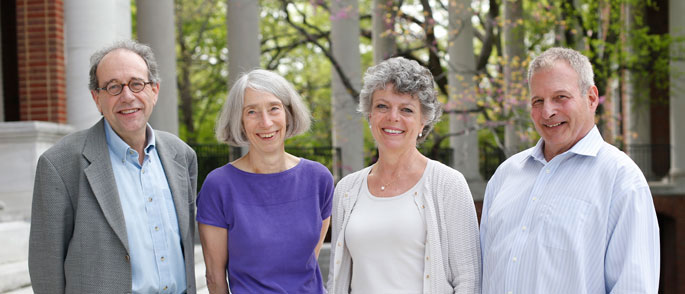
by Jane Sevier
Two Vanderbilt professors have been named members of the National Academy of Education, an association dedicated to advancing high quality education research and its use in policy formation and practice.
Richard Lehrer, Frank Mayborn Professor, and Leona Schauble, professor in the Department of Teaching and Learning at Vanderbilt Peabody College of education and human development, join colleague Paul Cobb, Peabody Professor of Teaching and Learning, as NAE members.
“Professors Schauble and Lehrer are leading experts on children’s development of scientific and mathematical reasoning and knowledge,” Camilla Benbow, Patricia Rodes Hart Dean of Education and Human Development, said. “Their work has demonstrated that an understanding of psychology and cognition can be used to improve math and science learning among all students, including those of lower socioeconomic status. By applying scholarship in the service of a wider social good, they uphold an important ideal—expanding knowledge for the benefit of all people.”
Schauble is a cognitive developmental psychologist who studies the relations between everyday reasoning and more formal scientific and mathematical reasoning. In particular, Schauble and frequent-collaborator Lehrer have used model-based reasoning, inference and induction to cultivate content knowledge and develop learning progressions.
This work has had implications for science and mathematics curricula, school reform, teacher preparation and professional development, and for learning in settings outside of school.
Over time, Schauble has built a formidable body of work demonstrating how math and science learning can build cumulatively toward deep levels of understanding. Shortly after completing her undergraduate degree, Schauble joined the staff developing Sesame Street at the Children’s Television Workshop.
Her years at CTW provided practical experience in educational research and design, another of her research interests. After completing a Ph.D. in developmental and educational psychology at Columbia University, she became a postdoctoral fellow and later a research scientist with the Learning Research and Development Center at the University of Pittsburgh. In 1992, she moved to the faculty of the University of Wisconsin-Madison. She came to Vanderbilt in 2002.
Lehrer is a former high school sciences teacher who completed a Ph.D. in educational psychology and statistics at University at Albany, State University of New York. Thereafter he was the Sears-Bascom Chair of Education at the University of Wisconsin-Madison.
In this capacity, he collaborated with K-6 teachers to design classroom learning environments featuring tangible forms of mathematics, such as those describing space, measurement and data, to support the long-term development of mathematical ideas and the means (the mathematical practices) by which these ideas are developed and refined.
His research included analysis of teaching practices responsive to students’ ways of thinking and to teachers’ anticipation of likely trajectories of children’s conceptual change. In collaboration with Schauble, he also investigated how children’s science education could be productively centered about the invention and revision of models of natural systems.
Since coming to Vanderbilt in 2002, Lehrer has continued to pursue these interests in mathematical and scientific reasoning. In 2009, the American Psychological Association presented him its Award for Distinguished Contributions in Applications of Psychology to Education. Lehrer recently served on two panels for the National Research Council, one investigating assessment of learning in light of new national standards in science education and the other examining opportunities and obstacles for integrated STEM education. He is a fellow of the American Educational Research Association.
Celebrating its 50th anniversary in 2015, the NAE consists of 192 U.S. members and 11 foreign associates elected on the basis of outstanding scholarship related to education.